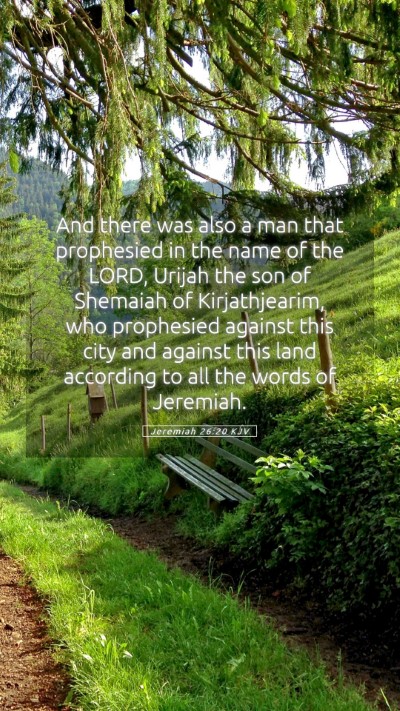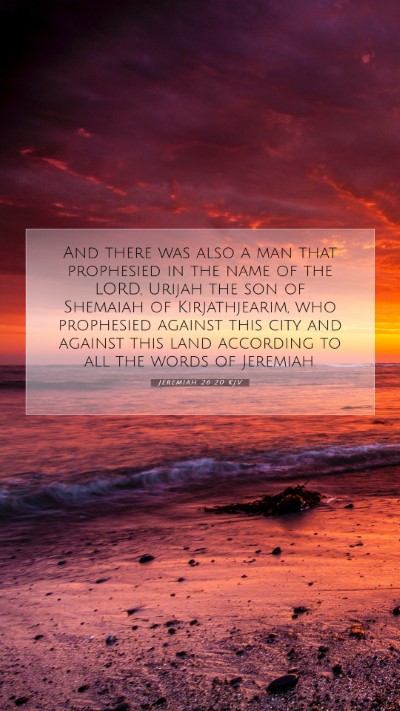Jeremiah 26:20 - Understanding the Verse
Bible Verse: “And there was also a man that prophesied in the name of the Lord, Uriah the son of Shemaiah of Kirjath-jearim: and he prophesied against this city and against this land according to all the words of Jeremiah.” (Jeremiah 26:20)
Overview of Jeremiah 26:20
This verse presents an important narrative within the broader context of the prophetic ministry during a tumultuous time in Judah. It highlights the courage and conviction of Uriah, a contemporary of Jeremiah, who spoke boldly against the disobedience of the people and foretold impending judgment.
Contextual Analysis
The prophecy of Uriah draws parallels with Jeremiah, placing emphasis on themes of fidelity, prophecy, and divine judgment. Understanding the historical backdrop is crucial for interpreting the significance of Uriah's ministry.
Historical Context
- Judah’s Apostasy: During the time of Jeremiah, Israel was straying from the covenant with God, resulting in moral decay and looming disaster.
- Role of Prophets: Prophets like Jeremiah and Uriah stood as voices of divine warning amidst rebellion, often leading to personal peril.
Commentary Insights
Various commentaries provide rich insights into this verse.
Matthew Henry’s Commentary
Matthew Henry emphasizes the courage shown by Uriah in speaking God’s truth despite the men's opposition. He points out that the acceptance of false prophets often leads nations into ruin while the true messages from God are met with hostility.
Albert Barnes’ Notes
Barnes elaborates on Uriah's actions, noting how his ministry reflected the gravity of divine warning. His mention in conjunction with Jeremiah serves to illustrate that God’s message does not perish with one messenger; it is timeless and always relevant.
Adam Clarke’s Commentary
Clarke expounds on the significance of faithful witness, asserting that the mention of Uriah highlights the consequences of true prophetic ministry and reminds believers of the perils faced by those who faithfully proclaim God’s word in hostile environments.
Thematic Exploration
In a broader sense, Jeremiah 26:20 touches upon several themes vital for Bible verse understanding:
- Faithfulness in Prophecy: The courage to uphold the truth of God’s Word even against overwhelming opposition.
- Consequences of Rebellion: This verse illustrates the dire consequences that follow a nation ignoring divine counsel.
- Continuation of God’s Message: The multiplicity of messengers highlights God’s relentless pursuit in conveying His message to humanity.
Application of the Verse
When exploring the personal application of Jeremiah 26:20, believers can reflect on the following:
- How do we respond to messages that challenge our comfort zones?
- Are we bold in sharing God's truth in our lives?
- What can we learn from the consequences of rebellion depicted in the lives of Uriah and Jeremiah?
Related Bible References
This verse is connected to several other important passages:
- Jeremiah 20:1-3: Jeremiah faces persecution for proclaiming God’s word.
- Matthew 5:10: Blessed are those who are persecuted for righteousness' sake.
- Isaiah 30:10: The people desire prophets who speak smooth words, indicative of their resistance to truth.
Conclusion
In conclusion, Jeremiah 26:20 serves as a powerful reminder of the role of God’s messengers throughout history. Exploring this verse enriches our Bible verse understanding and deepens our Bible study insights into the nature of divine truth, the responsibilities of believers, and the consequences of abandoning God’s ways.


